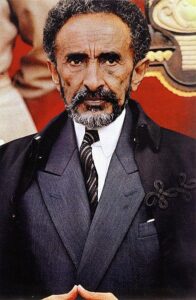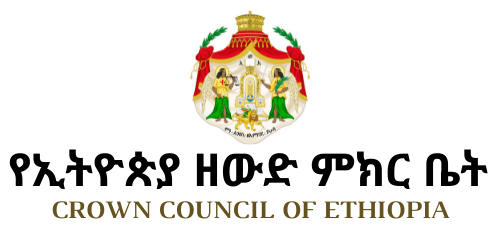27 August 2025 / 21 ነሐሴ 2017 – Today, as we remember the murder of His Imperial Majesty exactly fifty years ago, it is with many mixed emotions that we reflect on his full life and the controversies surrounding his extraordinary achievements and tragedies. In our reflection, we seek to examine the totality of his leadership and his humanity.

From the time of his birth until the end of his life the Emperor remained an enigma. He was caught in between two worlds, one so ancient and proud of its traditions and customs, the other in a rush to catch up with the twentieth century. Ethiopia, isolated from the world for centuries, was in the process of forging a nation-state despite the obstacles of its medieval legacy, struggling to create and maintain its sovereignty while facing both internal and external threats. Facing these seemingly irreconcilable challenges, the Emperor toiled with faith, discipline and resilience to bring modernization to his country and played a critical role in freeing Africa from the bondage of colonialism.
He faced great pain in childhood, from his mother’s death in his infancy and his father’s death when he was only thirteen. He faced total abandonment when he was forsaken and sacrificed during the crisis of the Italian invasion of Ethiopia in 1936 as a precursor to World War II. These challenges tested his faith in humanity and taught him the hypocrisy of international politics. They did not, however, deter him from seeking justice for his people, which won him admiration from freedom-loving people around the world.
The Emperor’s detractors have accused him of abandoning his nation to seek comfort and safety in exile. But this does not reflect the reality of his tireless work in those difficult years. The Emperor, despite having lost his throne and despite shameful attacks from the fascists, always maintained his dignity and worked tirelessly to free Ethiopia. He used his astute political skills and leadership ability to free Ethiopia and his people. Despite the heavy burdens, losses, and loneliness of exile he overcame these oppressive years and used them to reflect on what was to come.
After liberation in 1941 he faced the challenge of rebuilding his nation, which had suffered from a brutal invasion. The execution of the few educated Ethiopians by the Italians made his task that much more difficult. He had to uplift his nation from collective trauma and give his people hope for the task of rebuilding which lay ahead. The Emperor’s wise call to seek no revenge on his enemies won him the admiration of people and leaders worldwide.
With great vigor and vision, the Emperor began to rebuild his nation once more. With an emphasis on education, he would go on to build an educated class who would manage and assist in the development of Ethiopia. He made huge strides in expanding agriculture, education, and industry. He was able to build a modern Army, Air Force, and Navy. Despite these remarkable achievements, his success in bringing modernity to our nation was tested by the divisions and internal conflicts that had plagued Ethiopia for centuries.
His later reign was tested by rising expectations. The ensuing years were marked by secessionist movements and the growing demands of both the student movement and the bureaucracy. The Emperor failed to recognize early the demands for change that would eventually overthrow him and bring the country untold misery and terror. The years of civil war, terror, and famine became the hallmarks of a nation descending into an abyss. These years took a tremendous toll. The Ethiopian people yearned for change and a faster trajectory towards democracy and economic development. Instead, they were held hostage to lawlessness and the breakdown of a culture forged over centuries, after which raw power was the only solution offered to a complex set of problems and challenges.
We reflect now on the half century since the passing of our enlightened Emperor, who sacrificed so much only to be shunned and murdered by the same people he had hoped would shepherd Ethiopia into the twenty-first century. In the past fifty years we have failed to create a system based on laws, representation, and accountability. We have failed to reconcile with our history. We have failed to chart a vision for stability for our people and nation, and we have failed to offer a vision for Ethiopia to look confidently into the future.
As we look back on the past fifty years and examine the life and legacy of the Emperor, we remember that the Emperor was also human. His was a life of being tested, and of overcoming many personal tragedies. He carried the heavy weight of responsibility both as a head of state and head of the Ethiopian Orthodox Church.
He was a martyr who witnessed his nation betrayed, who saw his family members and the people he raised to lead his nation murdered. And yet he has not yet received the recognition he deserves both as a patriot and a world statesman.
His refusal to shed the blood of his own people when he had the full capacity to do so is exemplary of a leader who had deep faith and foresight. Despite all the criticism and efforts to tarnish the Emperor’s name and legacy, future generations will in the fullness of time appreciate his many achievements.
His work to fight injustice, to liberate Africa, and lend Africans a voice in the world stage is etched in history. He gave hope to the oppressed. He became a symbol of black pride all around the world. He became a father to an entire continent through the Organization of African Unity and inspired a global movement of black liberation through the Rastafarian nation.
As his grandson, I remember his encouragement in the pursuit of our studies. He taught us about our family, our duty, and our country.
We look forward to commemorating and celebrating his life for many years to come.
May God bless his life and memory.
by HIH Prince Ermias Sahle-Selassie Haile-Selassie, President of the Crown Council of Ethiopia





